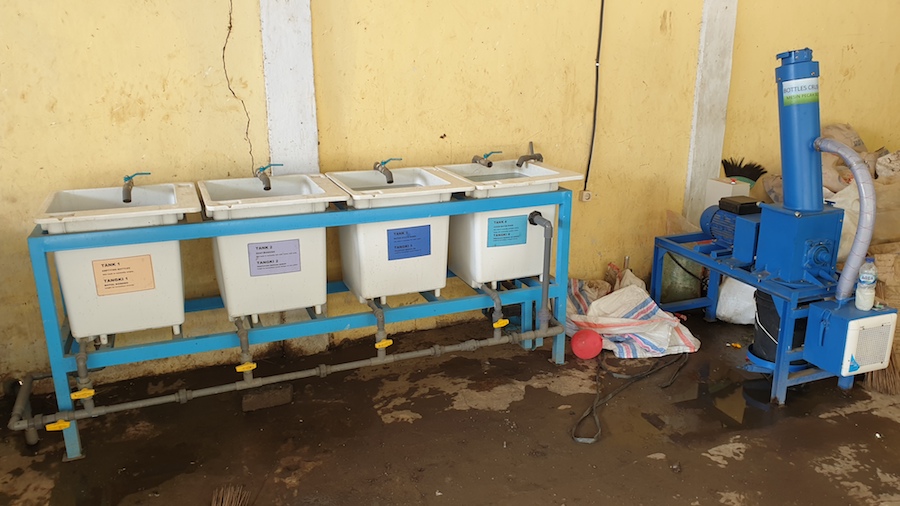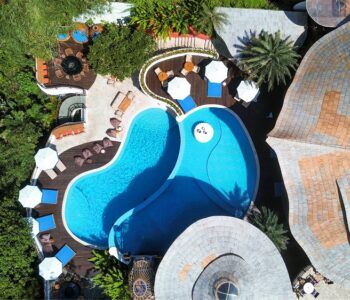Bali’s environmental challenges are well-known and ongoing. One of the main obstacles is how to manage household waste effectively. Every day the quantity of landfill waste dumped at Bali’s largest rubbish site, TPA Suwung, South Denpasar, is enormous, and beyond its capacity. Village administrations throughout the island are directed by the government to minimise the amount of landfill waste – they are not, however, instructed on how to do this.
“Indonesia needs to be aware of the ‘bigger picture’ in practical, sustainable waste management,” said Piet van Zyl, Sustainability Consultant of the R.O.L.E Foundation. Piet is currently overseeing the development of the Bondalem Eco Village Community Project, in Tejakula, North Bali. “The national government requires a blueprint for a circular economy that clarifies the responsibilities of all levels of stakeholders from the villagers, to the village, sub-district, regional and provincial level administrations, along with industry.”
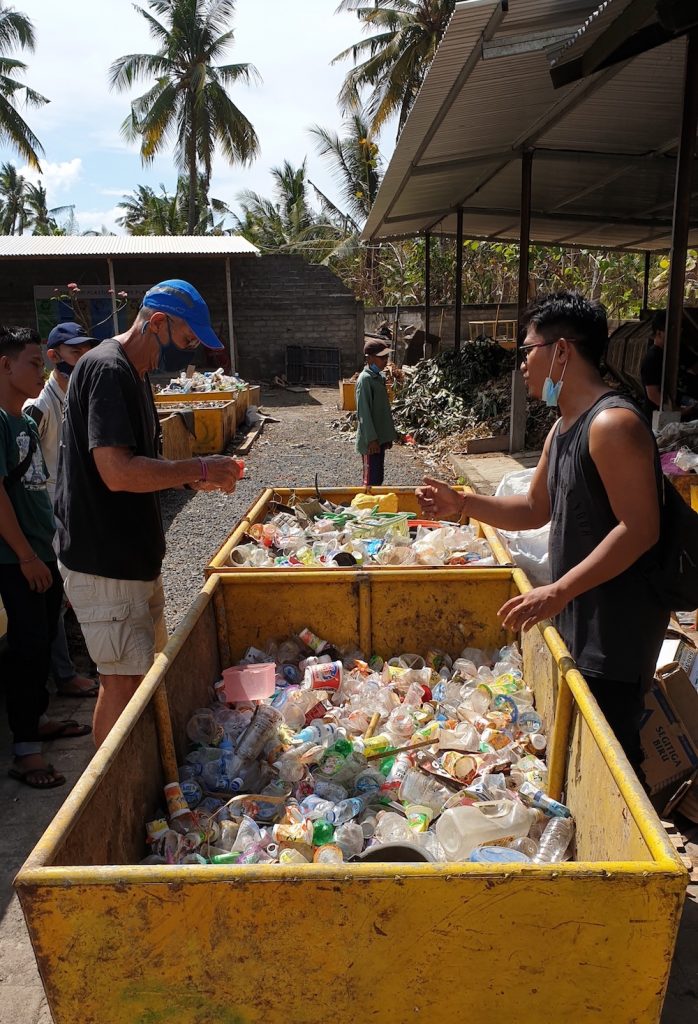
The Bondalem Eco Village Community Group opened a waste treatment plant, TPST Buana Muda Bondalem on a 800 square meter site provided by the Bondalem village administration in July 2020. The site comprises of a covered workspace for household and commercial garbage processing whereby it is sorted into organic and recycled waste. Organic waste is processed into compost, packaged and sold to local farmers. Non-organic waste, plastic bottles and bags, and glass items are washed and prepared for recycling. TPST Bondalem employs full-time local staff and promotes awareness for socially responsible garbage management.
The first of its kind in Buleleng Regency, the project involves three levels of local government cooperation between the village to the sub-district of Tejakula and the regency administration of Buleleng. The initial funding project comes from the international English environmental foundation WasteAid, through R.O.L.E (Rivers, Oceans Land, Ecology), based in Nusa Dua Bali.
Among other projects around the island, R.O.L.E. has been instrumental in developing North Bali Eco Hub (N.B.E.H.) in Bondalem. N.B.E.H. will serve as a resource centre for all levels of the community. This includes industry and government, promoting and recommending through the broad, collective knowledge and information, solutions to Bali’s sustainability issues. R.O.L.E. has purchased processing machines to create products for sale, such as Eco paving bricks which combine plastic and crushed glass.
Shredded plastic and organic compost is a vital source of income for the project. R.O.L.E. contributes to the management of T.P.S.T. Buana Muda Bondalem, providing training while working with the village administration to educate how village tourism can be a viable alternative to opening hotels in the area. The education programmes include ecology and waste management and target children, adults and the administration.
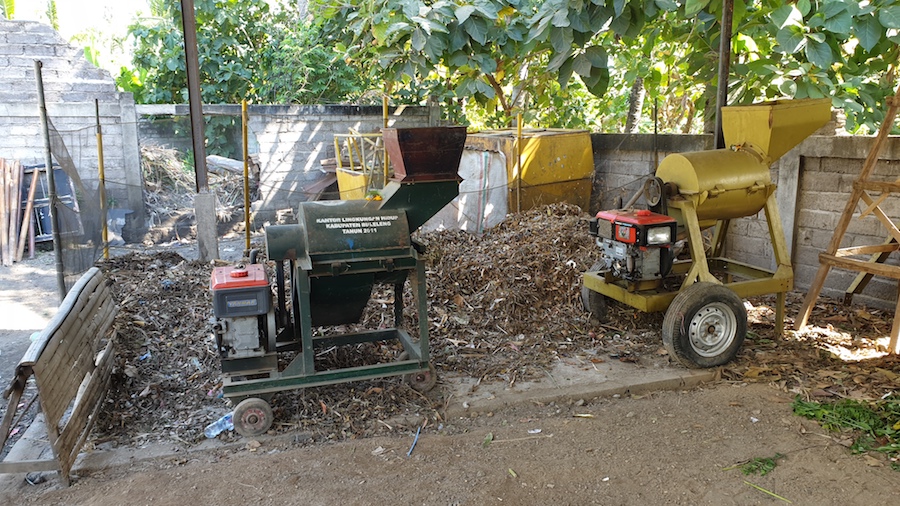
Changing systems, changing mindsets
“The concept of the circular economy is all about waste management,” Piet said. “The first step is that we must assess everything that our population consumes and see how we can design waste products out of the system. For example, if we replace a plastic disposable bottle with a glass bottle which, we are effectively designing the problem out of the system.”
Next is to ensure that whatever materials enter the system remain within the consumption loop, keeping it out of landfill waste. Sometimes certain waste products are burnt to generate energy sources, such as electricity, instead of entering a landfill. Poisonous gases, however, enter the atmosphere which we then breath in or via rain enter the soil becoming harmful waste products. The third aspect is the need to return all organic waste into the ground as compost instead of dumping it in a landfill. Composting generates healthy soil which in turn creates healthy food – the outcome is healthy people. The circular economy directly impacts the ecology and the people. Maintaining the balance of natural cycles is paramount.
“The only effective way to begin the process of sustainable waste management is by collecting and measuring data,” stated Piet.“ Data from TPST Bondalem reveals that 80% of all waste that arrives for treatment at the depot is organic. The problem is the depot is ineffectively dealing with this waste which then ends up polluting the environment in a landfill and producing the enormous stench commonly experienced in South Denpasar from TPA Suwung.”
But, what’s in it for me?
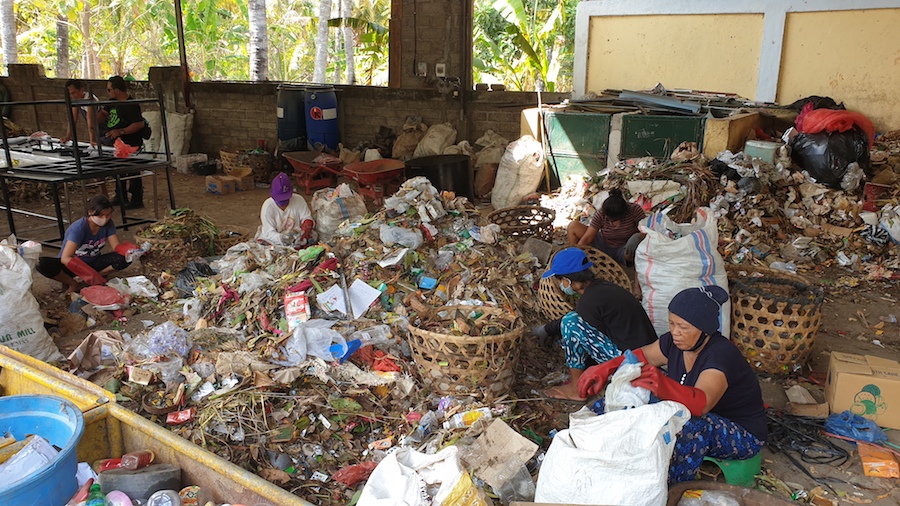
The challenge of protecting the health of the environment and the community involves ongoing education. “The villagers don’t understand the concept behind sorting out their rubbish at home and become lazy towards being responsible for it. All waste is typically thrown in together and then requires sorting into organic, reusable and non-reusable waste at the depot,” Piet said. “For the success of the circular economy, we need people to understand how they are benefitting.”
The simple step to help is for people to separate household waste at home into three bins – organic, recyclable and non-recyclable. People naturally ask, however, what’s in it for me? During Covid and the downturn in the economy, families are struggling financially. Offering incentives such as petrol vouchers and rice, for people to separate their household waste may be the motivational force to help this situation.
“The motivation for people to exchange plastic waste for certain gains, this is not the same as if they are motivated to keep plastic out of the environment. Bank Sampah (rubbish bank) functions as the solution to exchange household plastic waste for rice or petrol vouchers. The problem with this system, however, is there is not enough money in recycling to be sustainable,” Piet said.
You produce it, you pay for it
“A solution to this is for the manufacturers of plastic bottles to take some responsibility and pay a tax that is then passed on directly when consumers return bottles to the point of purchase. The tax can also help the governments pay for waste recycling depots in the villages. There is a waste added tax onto plastic bottles, bags and other plastic waste items.”
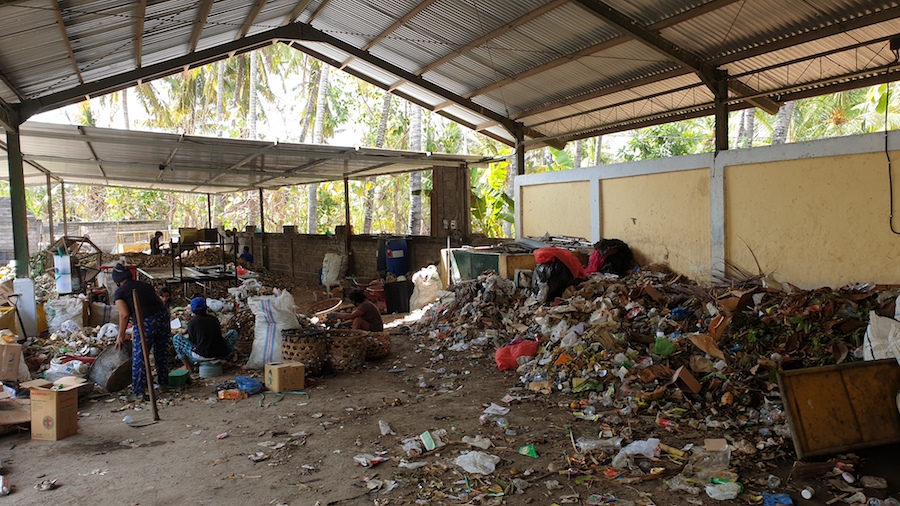
The government plays an essential role – their responsibility is to enforce the corporations to act. To avoid paying the tax, the manufacturers can then produce only recyclable bottles. This then returns to the system of the circular economy where certain waste products are kept out of the loop. At the moment the producers only stamp bottles indicating they are recyclable. The corporations must be compelled to do more!
“Data from TPST Bondalem reveals that three trucks per day dump waste at a regional landfill site,” Piet adds. “This can be reduced to one truck every three days by the sorting of rubbish at home. The potential financial gain to TPST Bondalem is about a Rp. 4 million reduction in fees to dump landfill in one month.”
The ongoing challenge of developing a functional and sustainable model to curb Bali’s environmental woes rest upon each individual’s shoulders. Shared responsibility and collaboration are essential – the keyword is community. Conveniently disguised behind the negative aspects of the pandemic is the opportunity for immense change. The island’s future rests not only in the hands of the Balinese, but also the government of Indonesia.
For more information go to rolefoundation.org
Richard Horstman
Artist-meets-writer, Richard sees himself as a mediator between the public and the art world. Whilst heavily active in the art world, in writing and more, he also shares unique stories found around Bali.
You’ll find him at lifeasartasia.art and on Instagram @lifeasartartasia

